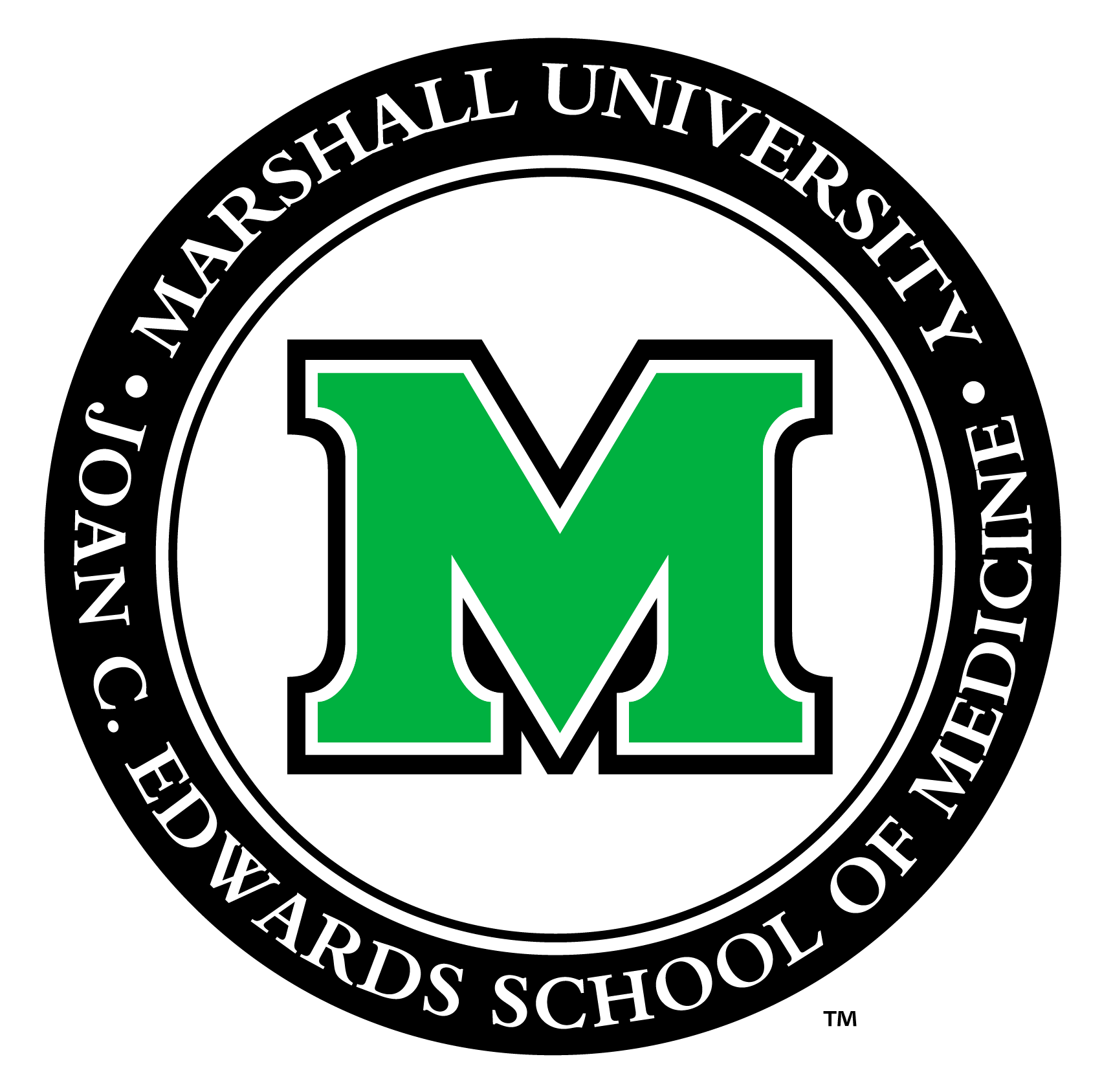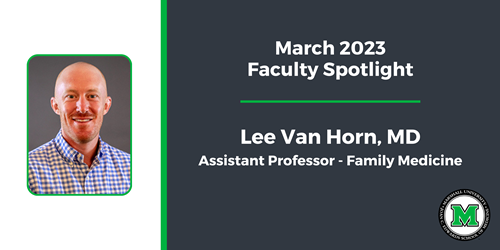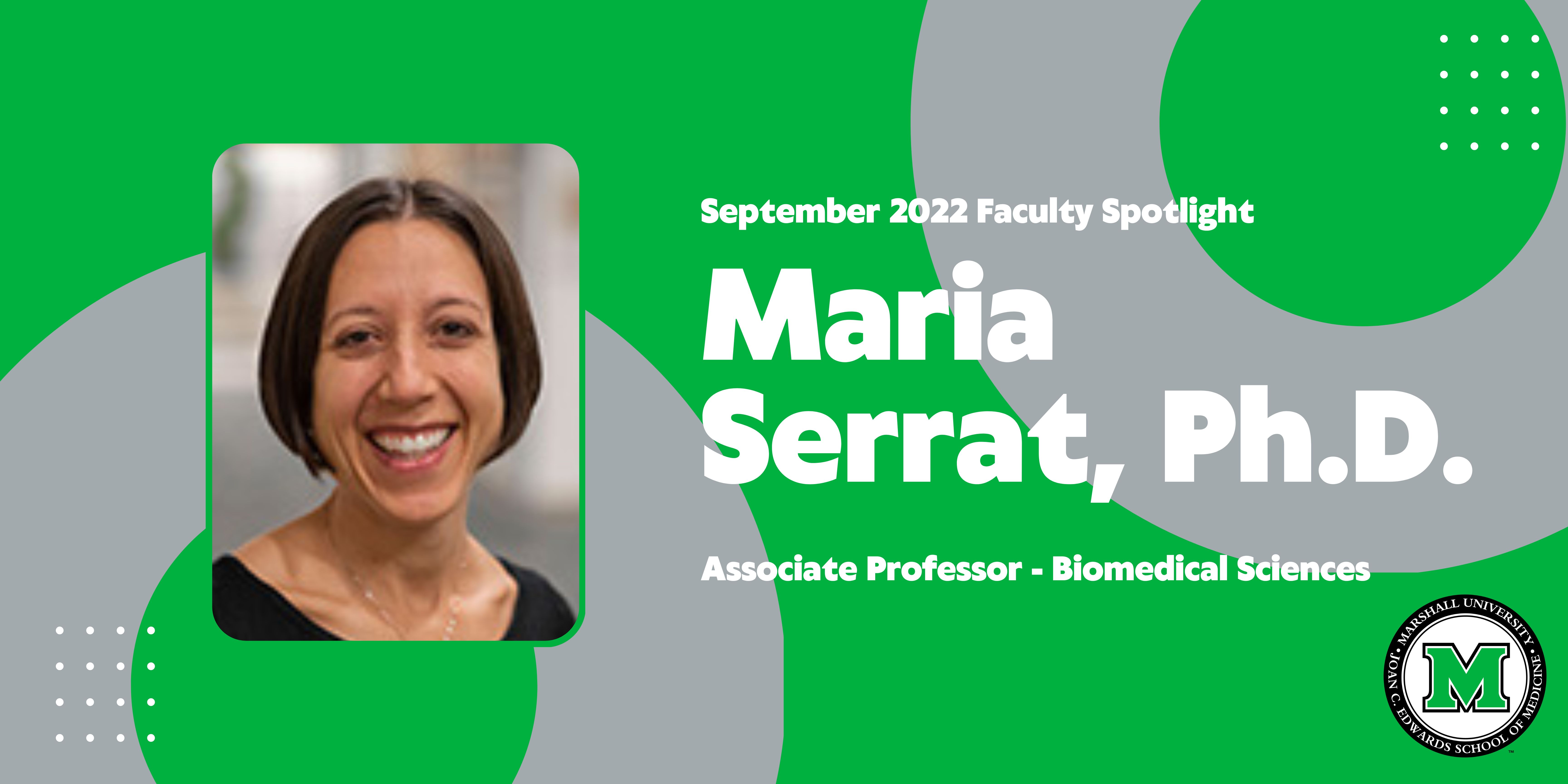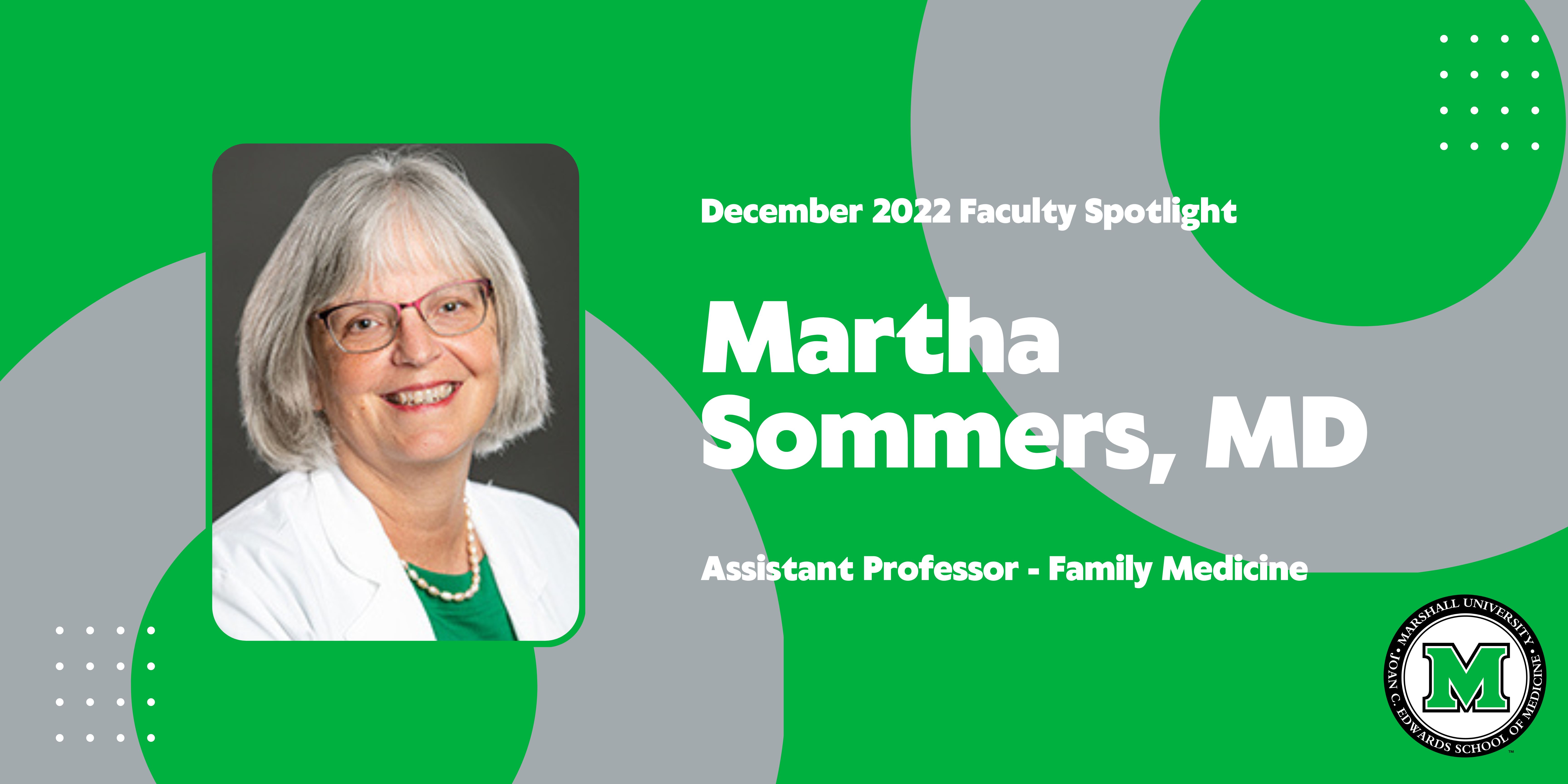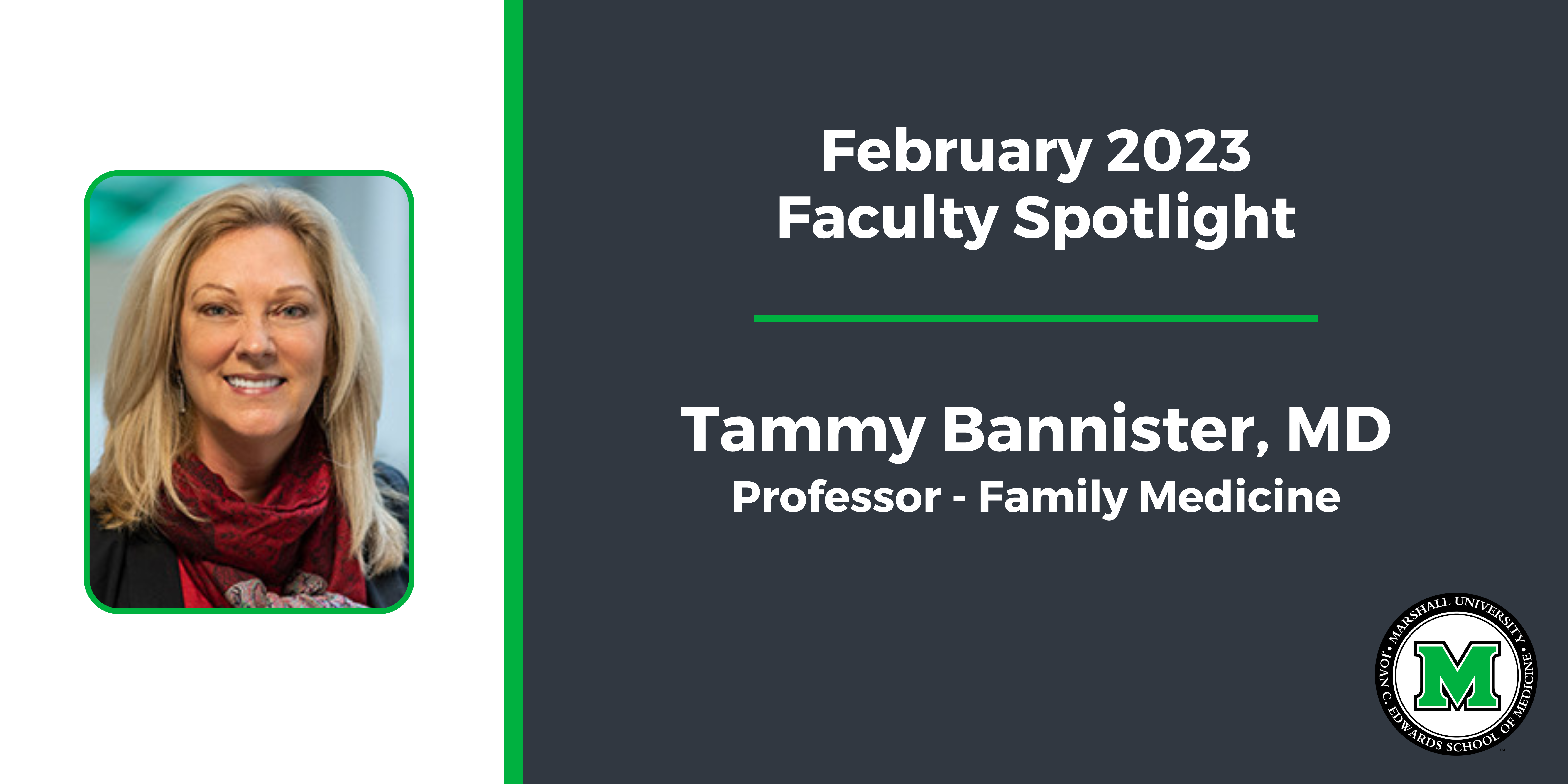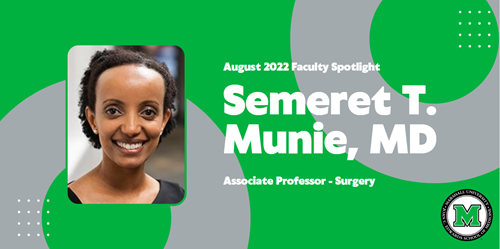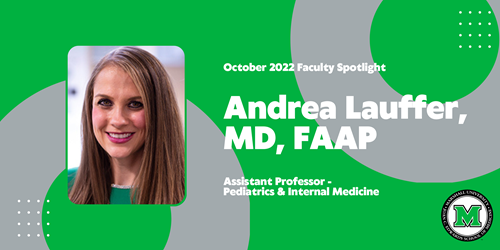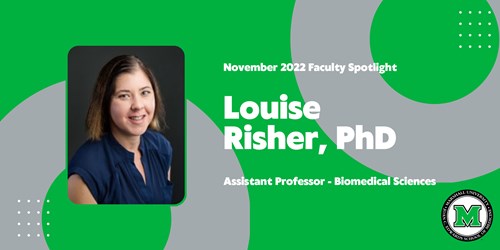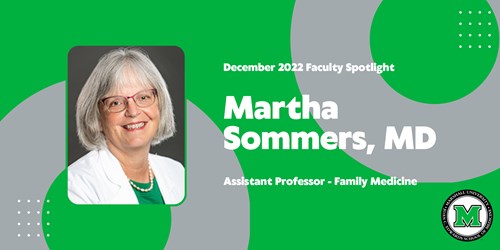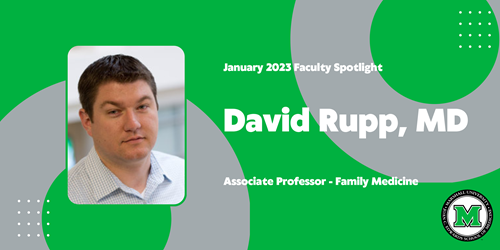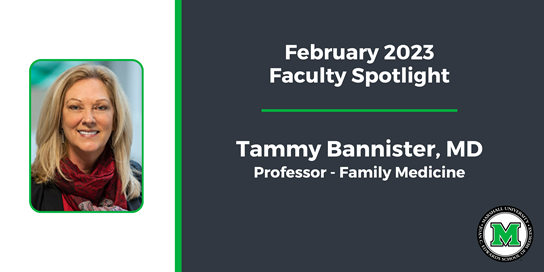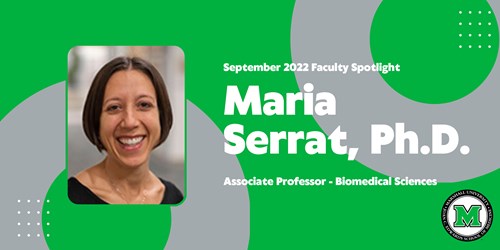
Q: Tell us about yourself!
Dr. Serrat: I am originally from northeast Ohio and spent two years in upstate New York before coming to Marshall in 2009. My husband also works at Marshall and we have a 6-year old daughter who was born here in Huntington. I received my Bachelor’s degree in Anthropology from Miami University (Ohio) in 1999 and Master’s (2002) and PhD (2007) in Biological Anthropology from Kent State University. I did postdoctoral training in cartilage imaging (skeletal growth plates) at Cornell University in 2008-2009. I teach gross anatomy and run a skeletal biology lab as Associate Professor here at the Joan C. Edwards School of Medicine in the Department of Biomedical Sciences with a joint appointment in Orthopaedics.
Q: What brought you to Joan C. Edwards School of Medicine?
Dr. Serrat: I was in the right place at the right time with the right skills. My entry into the job market coincided with the financial crisis of 2008. Amidst hiring freezes and limited positions, a fellowship from the American Association for Anatomy and resources from my postdoc mentor gave me the opportunity to extend my postdoctoral training for 1-2 more years. It was during this time that I was made aware of an opening at Marshall’s Joan C. Edwards School of Medicine in what was then the Department of Anatomy and Pathology. I don’t remember the exact wording of the job ad (though I bet I still have it on file), but I felt that it had been written for me. The Department was looking for someone with experience teaching medical gross anatomy and conducting skeletal biology research. It sounded like the perfect fit so I applied. My first interview was cancelled due to a snowstorm that shut down the state in January 2009. After googling pictures of a few inches of snow in Pullman Plaza, I could not comprehend this because I grew up in the snowbelt just south of Cleveland, Ohio and was living in Ithaca, New York, where I had just driven into the lab during several feet of snowfall. [Side note – having lived in Huntington for the past 13 years, I get it now]. I did finally make it to interview that February and was offered, and ultimately accepted, the job. Amidst curricular, institutional and departmental reorganizations over the past decade plus, I have still been able to do the two things that I love: gross anatomy teaching and skeletal biology research.
Q: Why did you choose your field of practice and what do you enjoy about it?
Dr. Serrat: I fell in love with anatomy during my sophomore year of high school, circa 1992. I remember my amazement when my group’s indiscernible fetal pig dissection was transformed into a magnificent work of anatomical art by the effortless skill of our biology teacher, a Catholic Franciscan brother who taught us that food and sex were the primary drivers of evolution. When our class visited the Cleveland Museum of Natural History later that year, I simply could not stop looking at the skeleton of “Lucy,” a 3.2 million-year-old fossil of what was then the oldest known human ancestor [scientists now date the oldest human ancestors back to 5.8 million years]. I’m pretty sure I lost my class during the visit. I can’t even tell you specifically what I found so intriguing about the fossil, other than a pure fascination with skeletal anatomy and/or old stuff (I am equally intrigued by old houses). I eventually found myself in graduate school pursuing Biological Anthropology and had the opportunity to teach human gross anatomy starting in 2002. It seemed I improved a bit in the 10 years following my lousy pig dissection, and I was actually quite good at human anatomy. At that point, I knew it was what I wanted to teach. My postdoc mentor, who taught veterinary gross anatomy at Cornell University’s College of Veterinary Medicine, is the one who helped direct my research away from anthropology and into basic bone biology. I ultimately chose to pursue a career in academia that gave me time for research and teaching because I couldn’t imagine doing anything else. I knew that I would never be happy doing only one or the other (research versus teaching), and I knew I would not be happy in a setting where I could not control the line of research that I pursued. Academia gave me that ideal balance between self-directed research and team-based teaching opportunities.
Q: What is your scholarly interest?
Dr. Serrat: My laboratory specializes in postnatal skeletal growth. We use in vivo models to study the physiological regulation of bone elongation and the influence of environmental factors, such as temperature and diet, on the bone lengthening process. From measuring the effects of temperature on bone length and blood flow in mice during my graduate work to imaging real-time molecular transport to growing bones during my postdoc, I have dedicated my career to understanding mechanisms of bone growth regulation. Research in our lab here at Marshall takes an integrated approach to these problems by employing tools such as multiphoton-based live animal imaging and mouse model of temperature- and diet-enhanced growth to identify mechanisms, and potential interventions, for pediatric growth disorders.
Q: What is your favorite part of the job?
Dr. Serrat: I love having the freedom to pursue scientific research that interests me and to share my enthusiasm for research and teaching with trainees. I couldn’t imagine not having this dual role in academia. To me, the most exciting part about research and discovery is being able to include others in the learning process, from colleagues and collaborators to students and trainees. I am so fortunate that I get to wake up every day and do something that I find interesting. I’ve been able to present my work in 5 (soon to be 6) countries and network with some of the top scientists because of my job. I have served on the Board of Directors of the American Association for Anatomy and learned from the leaders in my discipline. No two days are alike and I always look forward to learning and growing as an educator and researcher.
Q: What do you do during your free time?
Dr. Serrat: I try to make the most of every minute I get to spend with my 6-year old daughter, who is growing up way too fast in first grade, and my husband, who works night shift. We love to camp (“glamp”), bike, ski, and visit my parents at the beach in Florida. We also have a plot at the community garden, which doubles as a fantastic sledding hill behind our house in the winter (our daughter helps us “feel” young)!
Q: What is the best piece of advice that you’ve received?
Dr. Serrat: This is hard to answer because I have gotten so much good advice during my career. I probably learned the most when my postdoc mentor cautioned each of us that “your poor planning is not my emergency!” This is salient advice because there is so much packed into that simple statement, which helped me learn to: respect others’ time; own my mistakes; plan ahead; communicate; prioritize; manage my time; strictly adhere to starting and ending times, whether it’s a course lecture or invited talk; make contingency plans when I know that I cannot meet a deadline; schedule meetings in advance rather than expect someone to drop what they are doing to address a question that may be unimportant to them at that very moment (asking “is this a good time” or “is there a time we can talk” goes a long way); and set the same standards and expectations for my mentees. Obviously, things don’t always work out even with the best intentions or the most careful planning, so I do my best to adapt, accommodate, take personal responsibility when the shortcomings are mine, and be understanding when they are not (because the next time they could be).
Q: What is a piece of advice that you would give to a new faculty member of the Joan C. Edwards School of Medicine?
Dr. Serrat: See above. I think we all could use a reminder at some point that “our poor planning is not someone else’s emergency,” regardless of that someone else’s rank or role. Try to keep that in the back of your mind and it will almost certainly be to your benefit. At the same time, always know your value and don’t be afraid to speak up, stand out, take risks, and reach out to any and every one that could possibly help. Just do it respectfully and realize that your immediate priority might be at the very bottom of someone else’s very long list of to-dos (if even on their list). In other words, don’t let yourself into someone else’s office uninvited, remember to ask if now (or perhaps later) is a good time to discuss your concerns, and do your best to provide plenty of advance noticed when you need something from anyone else because you don’t know what other deadlines and commitments they might already have.
Also, take time to have fun. I didn’t learn to do this until I had my daughter. It was also when I learned how quickly kids can acquire skills if you immerse them early, so don’t hesitate doing the activities you love because you think your kids can’t participate. Our daughter was skiing black diamonds at Snowshoe by 5 years old because she was too young to realize that she should be scared (although a little fear on the ski lift might have been helpful)! Bottom line, whether you have kids or not, you won’t be less busy later, so figure out how to fit in the fun stuff now.
